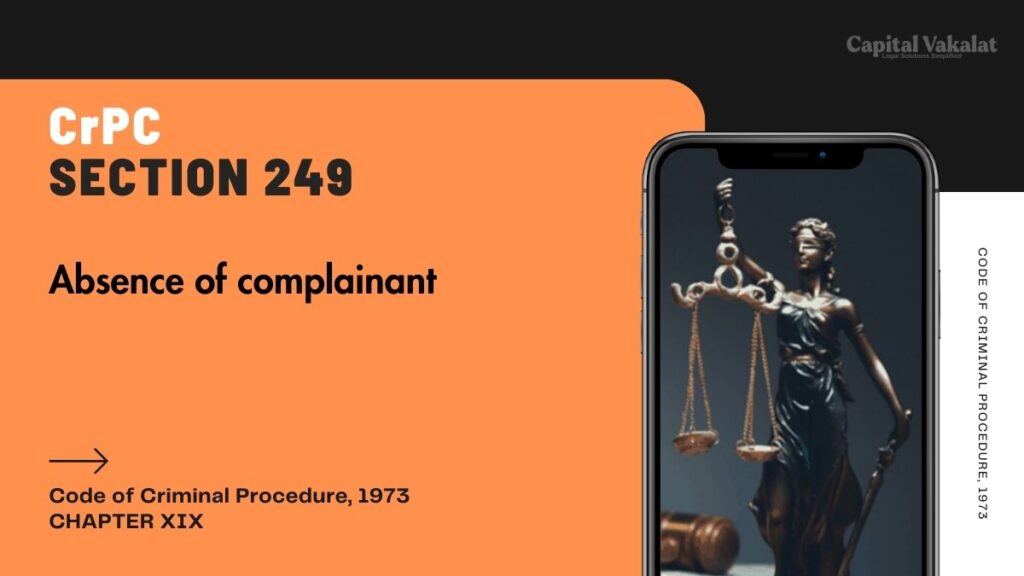The criminal justice system in India is an intricate network of statutes, regulations, and legal precedents designed to maintain law and order. One of the critical components of this system is the Criminal Procedure Code (CrPC), which outlines the processes and procedures for the administration of criminal law in India. Among its various sections, Section 249 CrPC: Absence of Complainant holds significant importance.

This section addresses scenarios where the complainant, the person who has filed the complaint, fails to appear in court. Understanding the nuances of this section is crucial for legal professionals and individuals involved in criminal proceedings.
Bare Act. Section 249 Cr.P.C.
Absence of complainant.
When the proceedings have been instituted upon complaint, and on any day fixed for the hearing of the case, the complainant is absent, and the offence may be lawfully compounded or is not a cognizable offence, the Magistrate may, in his discretion, notwithstanding anything hereinbefore contained, at any time before the charge has been framed, discharge the accused.
Comprehensive Overview of Section 249 CrPC
Section 249 of the Criminal Procedure Code provides the court with the authority to dismiss a complaint when the complainant does not appear on the date fixed for the hearing. This provision is essential for ensuring that the legal process is not unnecessarily prolonged due to the absence of the complainant.
Under this section, if the complainant is absent without sufficient cause when the case is called for hearing, the magistrate has the discretion to dismiss the complaint and discharge the accused. This dismissal, however, does not amount to an acquittal and leaves room for the complainant to re-file the complaint.
Historical Context and Evolution
The inclusion of Section 249 in the CrPC was a thoughtful measure to streamline court proceedings and prevent the misuse of the judicial process. Historically, the absence of complainants led to significant delays and backlogs in courts. By empowering magistrates to dismiss complaints in such scenarios, the drafters of the CrPC aimed to ensure a more efficient legal system.
Over the years, amendments and judicial interpretations have refined the application of Section 249. These changes have balanced the interests of justice with the need for procedural efficiency, ensuring that neither the complainant’s rights nor the accused’s rights are unduly compromised.
Legal Interpretation and Judicial Precedents
Judicial interpretations of Section 249 have provided clarity on its application. Courts have consistently held that the power to dismiss a complaint should be exercised judiciously, considering the circumstances of each case.
For instance, in the landmark case of Kishan Singh vs. State of Bihar, the Supreme Court elaborated on the discretionary power of magistrates under Section 249. The court emphasized that while dismissal of the complaint is permissible, the magistrate must ensure that the absence of the complainant is without sufficient cause and not due to genuine difficulties.
Procedural Aspects and Implications
The procedural aspects of invoking Section 249 CrPC are straightforward yet critical. When a complainant fails to appear, the magistrate must first ascertain whether the absence is without sufficient cause. If it is determined that the complainant’s absence is unjustified, the magistrate can proceed to dismiss the complaint.
However, the implications of such dismissal are significant. It results in the discharge of the accused, which, while not amounting to an acquittal, provides temporary relief. The complainant retains the right to re-file the complaint, but this process can be cumbersome and may lead to additional legal complexities.
Impact on the Complainant and the Accused
The absence of the complainant can have varied impacts on both parties involved. For the complainant, failing to appear in court can result in the dismissal of their case, causing frustration and necessitating the re-filing of the complaint. This process can be time-consuming and may require additional resources.
For the accused, the dismissal of the complaint provides immediate relief, though it does not equate to a complete exoneration. The possibility of the complainant re-filing the case means that the legal battle may not be entirely over, leaving the accused in a state of uncertainty.
Practical Scenarios and Case Studies
Several practical scenarios highlight the application of Section 249 CrPC. In cases where the complainant is unable to attend due to medical emergencies or unavoidable circumstances, courts have shown leniency. However, in instances where the absence appears to be a deliberate tactic to delay proceedings, magistrates have not hesitated to dismiss the complaints.
One notable case involved a complainant who repeatedly failed to appear for the hearings without providing a valid reason. The magistrate, after issuing several warnings, invoked Section 249 CrPC and dismissed the complaint, illustrating the court’s commitment to preventing abuse of the judicial process.
Role of Legal Counsel and Strategies
Legal counsel plays a crucial role in handling cases involving Section 249 CrPC. For the complainant’s side, it is imperative to ensure consistent communication and attendance at court proceedings. If absence is unavoidable, informing the court beforehand and providing valid reasons is essential to avoid dismissal.
For the defense, monitoring the complainant’s attendance and being prepared to invoke Section 249 CrPC strategically can be beneficial. However, it is important to use this provision ethically and within the bounds of legal propriety.
Future Prospects and Reforms
As the legal landscape evolves, there is a continuous need to reassess and refine procedural laws like Section 249 CrPC. Future reforms could include clearer guidelines on what constitutes “sufficient cause” for absence and streamlined processes for re-filing complaints to balance efficiency with fairness.
Conclusion
Section 249 CrPC plays a pivotal role in the Indian criminal justice system by addressing the absence of the complainant in court proceedings. It ensures that the judicial process is not unduly delayed while providing mechanisms for both complainants and the accused to seek justice. By understanding the legal interpretations, procedural implications, and practical applications of this section, stakeholders can navigate the complexities of criminal litigation more effectively. Continuous dialogue and potential reforms will further enhance the balance between efficiency and fairness in the administration of justice.